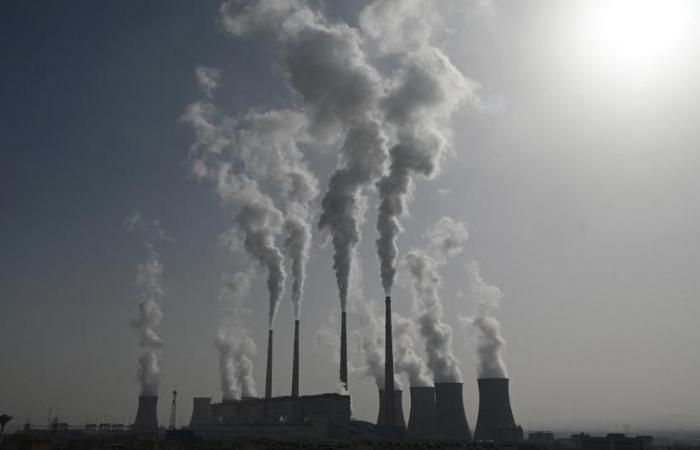They call themselves “green” but in detail, their investments tell a completely different story. Sustainable investment funds sold in Europe invest tens of billions of dollars in the most polluting industries on the planet without breaking regulations. This is what reveals an investigation carried out by RTS, Voxeurop and its partners in the European network of investigative journalists EIC.
This is the segment of finance that is a hit: sustainable funds. Enough to miraculously combine financial gains and preservation of the planet. And yet, an investment analysis of more than 4,000 funds sold in Europe and part of a database from LSEG, the operator of the London Stock Exchange, with data as of the end of the third quarter of 2023 (read our methodological box), shows a much less rosy reality.
In total, these vehicles, which are baskets of shares, considered green, have invested 87 billion dollars (77.7 billion francs) in the 25 companies that emit the most CO2 in eight sectors (oil and gas, extraction of coal, agriculture, steel and minerals, aeronautics, automobiles, fashion, maritime transport). In the lead, oil and gas which collects 33 billion dollars.
TotalEnergies alone has raised just over 10 billion from these sustainable funds, while developing new deposits. The French company is followed by Shell and Inditex, the owner of Zara (more than 5 billion each). Exxon, considered one of the worst performers in its sector in terms of emissions reduction targets, also collected more than 2.3 billion.
External content
This external content cannot be displayed because it may collect personal data. To view this content you must authorize the category Infographics.
Accept More information
Deutsche Bank in the lead
Even Aramco, world champion in CO2 emissions, whose reduction targets are the lowest in the top 25 companies in the sector, collected some 270 million. In Switzerland, the two biggest polluters, Holcim and Glencore, are also among the beneficiaries, collecting 1 billion and 600 million respectively via investment funds supposed to choose sustainable investments.
Swiss banks are not left out with 4.7 billion invested. UBS (1.8 billion), Pictet (961 million), Edmond de Rothschild (541 million), Credit Suisse (461 million) and Quantex, which belongs to the Liechtenstein bank, but listed on the Swiss stock exchange, LLB (301 million) , are the main Swiss entities concerned (read their position paper below).
External content
This external content cannot be displayed because it may collect personal data. To view this content you must authorize the category Infographics.
Accept More information
Among their “favorite” polluters, RWE, the German energy specialist, one of the largest emitters in Europe (623 million), Total (542 million), the Indian oil company Reliance Industries (291 million) and Inditex ( 280 million).
This is only a small portion of their investments and none of it is illegal. The European Union introduced regulations in March 2021 requiring all investment fund issuers to provide information on the sustainability objectives of their products. These rules apply to all banks or companies that sell funds in the Union, even if they are based outside. At the top of the list, DWS, the asset management subsidiary of Deutsche Bank, BlackRock, followed by Amundi, which belongs to Crédit Agricole.
With this regulation, the EU aimed to improve transparency, prevent greenwashing and push industry to finance the energy transition. It therefore required fund providers to detail their sensitivity to sustainability. Either they have none, or their funds integrate so-called “ESG” (environmental, social and governance) criteria and are called in the jargon article 8 or light green. Or, third possibility, called Article 9 or “dark green”, these funds have a measurable impact.
>> Read also: Podcast – Is green finance really green?
Europe’s “good intentions”
“Europe’s intentions were good,” said Fiona Frick, founder of the Geneva-based company Circe Invest, which specializes in integrating sustainability into investment strategies. But the criteria are not clear enough, she laments, so “their understanding could depend on the consultant who advises the fund”.
In the end, “if you want to be sure of investing in a sustainable fund, you must choose an Article 9 vehicle. Otherwise, you must look on a case-by-case basis and question the manager about his practices.” Because with article 8, you can have different shades of green which sometimes turn gray, she says. “I don’t consider it to be a necessarily sustainable fund, because the definition is half-baked.”
If you want to be sure of investing in a sustainable fund, you must choose an article 9 vehicle. Otherwise, you must look on a case-by-case basis and question the manager about his practices.
This system is particularly criticized by NGOs. “The regulation was designed as a mechanism to promote transparency and not as a certification system. But that’s how the industry has treated it.
She began to declare that a fund was Article 8 or Article 9 and, in fact, sustainable. However, the SFDR is far from containing the requirements necessary to define the parameters constituting a sustainable investment. The result is that this could lead to more greenwashing, believes Niki Vischer, a finance specialist at Greenpeace.
Need for performance
The overwhelming majority of managers are content to exclude companies that are too dependent on coal – which is not necessarily defined – tobacco and unconventional weapons. As far as they explain it, managers can do pretty much whatever they want. They are based on ESG scores or indices, the functioning of which is not always easy to understand.
Which does not prevent them from displaying unequivocal names: “carbon neutral”, “low carbon”, “sustainable equities” or even “socially responsible”. While specifying in their ESG reporting that they do not have “sustainable investment objectives”. Which is in accordance with article 8, but may seem to contradict the names chosen. As for the investor, for whom the regulations should make their task easier, all they have to do is do their research in depth if they want to know to what extent their investments are ecological.
We must not deceive ourselves (…) every manager must ensure performance in relation to its benchmark index
“We must make no mistake,” continues Fiona Frick, “all managers must ensure performance in relation to their benchmark index.” And this is where certain polluters, particularly in energy, are making a comeback, because these stocks are part of the benchmark indices. Not holding them means that the manager takes a risk of underperformance. In the wake of the war in Ukraine and fears over energy supplies, shares of companies in this sector have risen well above average. Too tempting for managers, who must show that their fund offers gains, even if they present themselves as fans of “ESG” criteria.
The European Union is aware of the problem. Last year, it launched a consultation to improve – or change – these regulations. ESMA, the regulator, specified some criteria last May, in particular for the use of names indicating sustainable investments, which will have to change. In our survey, it appears that at least 20% of funds have problematic names. But, a symptom of European difficulties in regulating finance, this new clause remains optional for the moment.
Mathilde Farine and Matthieu Hoffstetter
With the collaboration of Tybalt Félix, Stefano Valentino (Voxeurop), who received financial support from the Bertha Challenge program of the Bertha Foundation, and Giorgio Michalopoulos (Voxeurop)
Information covered in La Matinale of June 25, 2024






